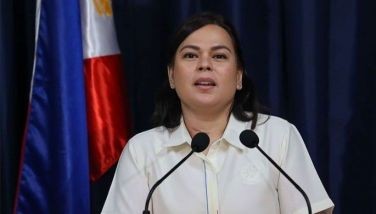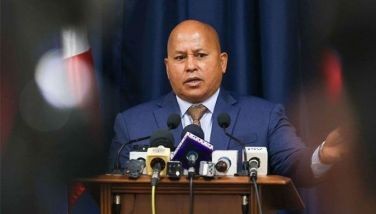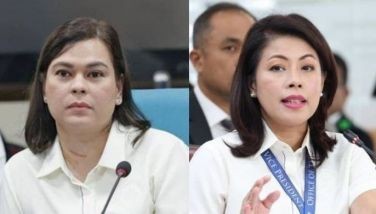COA not targeting certain individuals, Palace says
MANILA, Philippines - The release of a report by the Commission on Audit (COA) detailing misuse of lawmakers’ pork barrel in a three-year period during the previous Arroyo administration was not meant to divert the blame from congressional allies of President Aquino for possibly the same anomaly, Malacañang said yesterday.
Deputy presidential spokesperson Abigail Valte said COA cannot be faulted for releasing a 2007-2009 report on pork barrel use because the agency had also made public a similar report covering 2010 to 2012. Pork barrel is officially called Priority Development Assistance Fund (PDAF).
As a constitutional body, COA wields power as an independent agency.
Valte said information on PDAF use are available in the Official Gazette and on the COA website titled “COA Annual Reports on Allotments, Obligations and Disbursements of National Government Agencies (1997 to 2007 and 2009 to 2012 and 2013 partial).â€
Critics of the administration said the report was meant to divert attention from administration allies who may have misused their PDAF.
Asked why there was no special audit on pork barrel utilization during the time of Aquino, Valte said that based on what COA Chairman Grace Pulido-Tan said in a press briefing on Friday, the annual audit reports on the individual departments covered the PDAF use under the current administration.
“The COA report for 2010 onwards had been uploaded a long time ago. So, it is wrong to say that only the use of PDAF from 2007 to 2009 was looked into,†Valte said.
Valte said the public may pore over all COA reports posted online. “It is all there so you just have to look at their different audit observations for those years in question,†Valte said.
President Aquino, in an ambush interview in Subic Freeport in Olongapo City, said that irregular use of pork barrel funds had significantly decreased under his watch as he vowed to spare no one, even allies, in the ongoing investigation into PDAF misuse.
This was after the Department of Agriculture under Secretary Proceso Alcala was found to have released PDAF to questionable non-government organizations.
Senators and close to 200 members of Congress – through the Department of Budget and Management (DBM) – funneled P6.156 billion in pork barrel funds to 82 NGOs from 2007 to 2009, according to COA.
Tan said 10 of the NGOs have been identified with fugitive businesswoman Janet Lim-Napoles, while six have been linked to the families of sponsoring lawmakers.
Among congressmen with allocation of only P30 million to P70 million a year for projects, one – Manuel “Way Kurat†Zamora of Davao del Norte’s 1st District who is now Compostela vice governor – received some P3 billion, Tan told a news conference.
The DBM, according to COA, had even released P20 million in PDAF to a “ghost†lawmaker, a certain Luis Abalos.
Valte said she did not want to comment on the findings, which the COA chief described as “horrifying,†because doing so might give the report a political color.
She admitted the President’s office and the Department of Justice had been given an advance copy of the special audit report.
Valte also said the National Bureau of Investigation (NBI) is now looking into the matter. “Now, we will defer to the Office of the Ombudsman on any action that, in its judgment, should be taken in the wake of the findings of the Commission on Audit. However, these findings, as they have also been given to the secretary of justice, inevitably, will have an impact on the NBI investigation,†Valte said.
She said the COA findings can be used by the investigating team in finding out who had misused the PDAF.
Partly erroneous
For some administration lawmakers, the COA report was partly erroneous.
The lawmakers, who declined to be identified, said state auditors may have wrongly labeled realignments as pork when they were simply reallocations.
One House member said it was not unusual for lawmakers to push for realignment of certain appropriations during budget deliberations for other programs.
“For example, some congressmen see the budget for debt service too high and they thought it better to realign it, for example for the Philippine Sports Commission, and the movement is credited to them or they are ‘authors’ of that realignment, and that can be seen in the DBM records,†the Liberal Party lawmaker said.
He said other projects or agencies whose budgets usually benefit from realignment are government hospitals like the Philippine Heart Center. “Does that automatically become booked as graft-ridden pork just because I pushed for it?â€
He said requests for realignments also happen after calamities such as typhoons, when a congressman would lobby for an increased allocation for the Department of Public Works and Highways or the Department of Agriculture to fund projects for the repair of damaged roads.
Another House member insisted “there was no such thing as a P3-billion SARO,†referring to the Special Allotment Release Order to Zamora.
House members are allotted only P70 million each in PDAF annually while the amount is P200 million for each senator.
The same lawmaker also said the “Luis Abalos†referred to by the COA as “ghost lawmaker†was most likely then Mandaluyong City Rep. Benhur Abalos.
“There are good users as well as bad users of pork. We all want those accountable behind bars but the COA must be careful, or else this could backfire on them and the cases filed against those guilty would be weakened,†the lawmaker said, adding he shares the bewilderment of several of his colleagues as to why the COA had to hold a press conference on the matter.
Bohol Rep. Arthur Yap, who was agriculture secretary during the period audited, strongly denied he had anything to do with the disbursements the COA found to be questionable.
He said he issued a department-wide Memorandum Circular No. 1 in October 2008 imposing stricter regulations to protect public funds being used by non-government organizations (NGOs) and foundations.
“Funds are to be released only in tranches and only upon accomplishment or liquidation,†Yap told The STAR.
“If people found a way to circumvent the terms of my circular, they must now account for it in light of the COA findings,†he said.
Former Albay Rep. Edcel Lagman, who chaired the House appropriations committee from 2007 to 2008, stressed the PDAF has an “absolute ceiling.â€
“No member of the Congress can exceed his annual PDAF maximum allocation because the PDAF is not elastic,†Lagman said in a statement, as he stressed none of his pork went to bogus NGOs or foundations.
“It is a gross misimpression that all fund releases recommended or initiated by the members of the Congress are subsumed under PDAF,†he said.
He said some representatives and senators got additional funding, with the concurrence from the DBM, through the then congressional initiative allocation (CIA) and a few through a leadership allocation for ranking officers of the House and the Senate and chairs of major committees to whom numerous requests for funding were directed because of their congressional position.
These additional allocations, which are legitimately appropriated and transparently released, are not part of the PDAF, Lagman said.
Unlike the PDAF, which is for priority “hard†and “soft†projects for specific constituencies, the CIA and leadership fund can be released and utilized for nationwide implementation, he said.
Lagman said when he was chairman of the appropriations panel in the 14th Congress, he had a leadership fund like his predecessors and those who succeeded him, “but none of my fund releases were coursed through or ended up with Napoles-linked NGOs and other dubious organizations or foundations.â€
He said all his projects were validated and faithfully implemented and completed.
Dubious
In Davao City, a group certifying NGOs said those named as having received pork funds appeared to be of questionable background.
The observation was made by the Philippine Council for NGO Certification (PCNC).
“A review of organizations or foundations that were alleged to have received PDAF showed that they never applied nor received PCNC certification,†said Sonny Carpio, PCNC chairman.
Carpio is also an executive vice president and chief operating officer of Aboitiz Foundation, the social development arm of the Aboitiz Group.
PCNC is a private, voluntary, non-stock, non-profit corporation that certifies non-profit organizations that meet established minimum criteria for financial management and accountability in the service to underprivileged Filipinos.
“Many Filipinos have their hearts in the right place and have the intrinsic urge to help the underprivileged. We need to ensure that their kindness reach the right cause,†Carpio pointed out.
Carpio explained in a statement that his group assesses and certifies NGOs with “volunteer peer evaluators.†He said reputable executives from PCNC-certified organizations measure compliance with “good housekeeping†in partnership with the Philippine Institute for Certified Public Accountants (PICPA).
“Accountants from PICPA ensure that applicant NGOs are compliant with generally-accepted accounting principles and practices and the Philippine Financial Reporting System,†he said.
To date, PCNC has granted over a thousand certifications to NGOs with validity of one, three, and five years.
Meanwhile, a civil society group has voiced support for calls of faculty members of the University of the Philippines for the abolition of PDAF.
Social Watch Philippines (SWP) said the call complements their seven-year campaign for the abolition of Special Purpose Funds (SPF).
“SPFs are lump sum funds which are included as part of the General Appropriations Act. These are not as detailed and specific as the budget proposals of regular agencies. Once these are approved, they are vulnerable to reductions, transfers and ‘adjustments’ since these are lump sums,†SWP lead convenor and former National Treasurer Prof. Leonor Briones said in a statement.
SPFs accounts for 22 percent of the proposed 2014 General Appropriations Act for 2014. – With Paolo Romero, Edith Regalado, Rhodina Villanueva
- Latest
- Trending

































